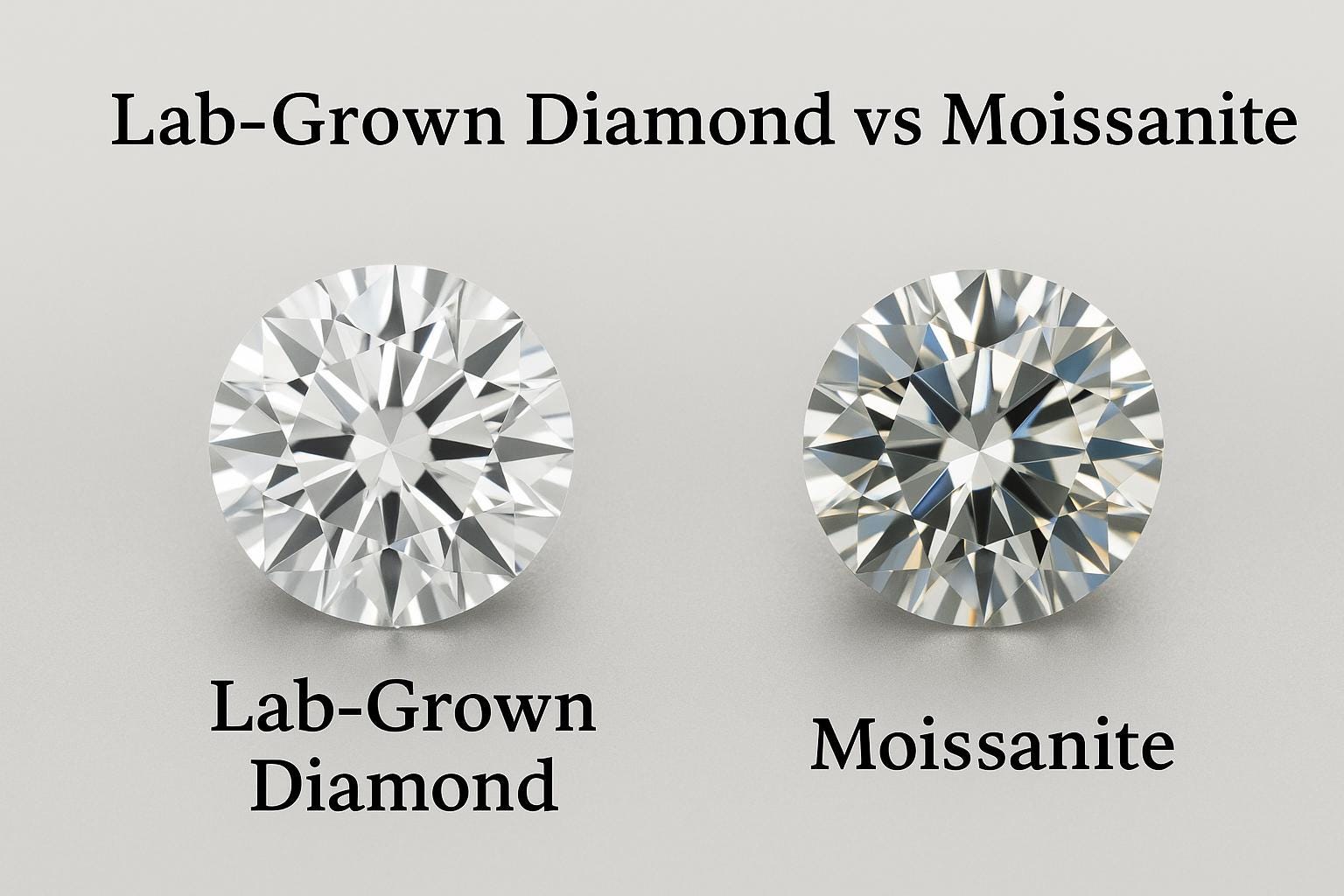Introduction
When searching for an affordable, ethical alternative to mined diamonds, most buyers end up comparing two leading options: lab-grown diamonds and moissanite. At first glance, they look nearly identical. But understanding their differences in brilliance, composition, durability, and value can help you make a smarter, more personal choice.
What Is a Lab-Grown Diamond?
- A lab-grown diamond is a real diamond, created using the same carbon structure as a natural one.
- Produced using advanced technology in a controlled lab environment.
- Identical to mined diamonds in physical, chemical, and optical properties.
- Certified by IGI or GIA, and used widely in engagement rings and fine jewelry.
What Is Moissanite?
- Moissanite is a completely different gemstone — made of silicon carbide.
- Originally discovered in a meteor crater, now recreated in labs.
- Known for intense sparkle, often even more fire than diamonds.
- More affordable than lab-grown diamonds but not classified as a diamond.
Visual Differences
- Moissanite tends to show more rainbow-like flashes (called “fire”), especially under direct light.
- Lab-grown diamonds reflect white light more like natural diamonds, offering classic sparkle.
- To the untrained eye, both stones may appear similar, but trained jewelers can spot differences.
Durability and Daily Wear
- Lab-grown diamonds score 10 on the Mohs scale (same as natural diamonds).
- Moissanite ranks 9.25, still extremely durable and suitable for daily wear.
- Lab-grown diamonds are ideal for lifelong wear like engagement rings; moissanite is great for fashion jewelry and budget-conscious buyers.
Price Comparison
- Moissanite is generally 50% to 70% less expensive than lab-grown diamonds.
- A 1-carat moissanite may cost $300–$600, while a lab-grown diamond of the same size with IGI certification can range from $800–$1,500 depending on cut and clarity.
- If you want a real diamond but not the mined price tag, lab-grown is the better value.
Certification and Resale Value
- Lab-grown diamonds come with IGI or GIA certification, adding trust and resale legitimacy.
- Moissanite does not receive diamond certification, although quality can be verified by reputable labs.
- Lab-grown diamonds tend to have higher resale interest due to diamond classification.
Which One Should You Choose?
Choose lab-grown diamonds if:
- You want a real diamond with identical properties to a mined one.
- Certification and long-term wear are important.
- You're shopping for engagement rings, heirloom-quality gifts, or timeless designs.
Choose moissanite if:
- You're looking for a budget-friendly sparkle.
- You love high fire and visual brilliance.
- You’re purchasing fashion-forward, non-traditional jewelry pieces.
Fuego Jewels Recommendation
At Fuego Jewels, we proudly offer both options:
- All lab-grown diamonds are IGI-certified and available in F-G Color / VS1–VS2 Clarity.
- Our GRA-certified moissanite features DEF Color and VVS1 Clarity.
- Every piece is customizable based on your stone preference and budget.
Conclusion
Both moissanite and lab-grown diamonds offer exceptional beauty and ethical sourcing. The right choice depends on your priorities — whether it's owning a true diamond or maximizing brilliance within budget. Whichever you choose, you can trust Fuego Jewels to deliver unmatched craftsmanship and service.
Call to Action
- Explore our lab-grown and moissanite collections
- Request a custom quote for any design in either stone
- Learn more in our Jewelry Education Center at Fuego Jewels

